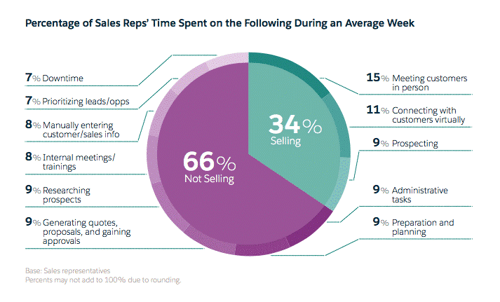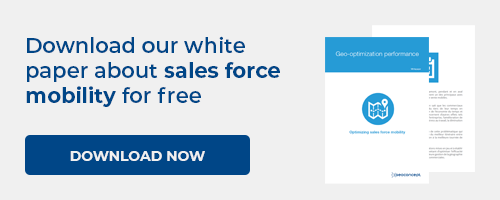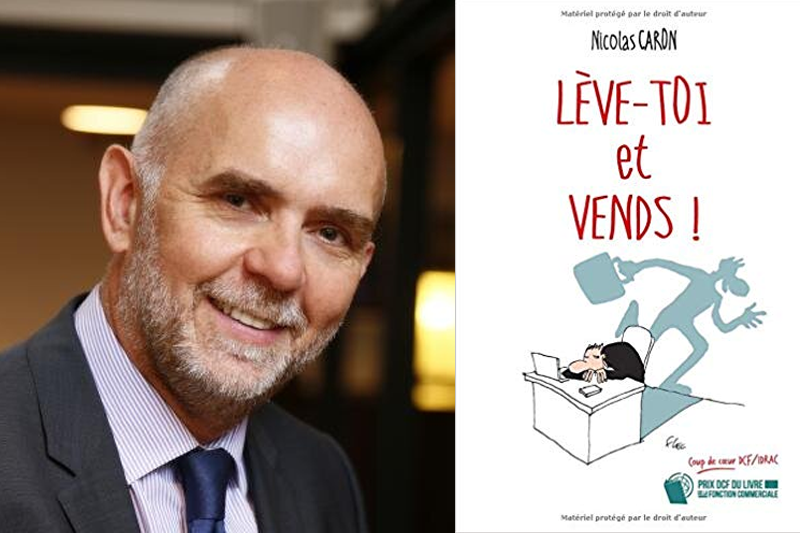The dividends of business efficiency are crystal clear for Nicolas Caron! Passionate about the Sales sector, in 2003 he co-founded the sales training and consultancy business  . Every year, they work with thousands of sales professionals from international market-leading companies all over Europe, Asia and North and South America.
. Every year, they work with thousands of sales professionals from international market-leading companies all over Europe, Asia and North and South America.
Once we had seen his book «Lève-toi et vends !», (Get up and sell!) – which is both very funny and to the point - we were keen to meet Nicolas in person… It’s a book that all sales professionals – and non-sales people too! – seeking to excel in the field should read!
Nicolas, can you tell us a bit about Halifax Consulting and the work you do?
Halifax Consulting is a company specialising in business performance. When we started out, we just offered training in business skills. Year after year, the range of business services we offered broadened: to training we added deployment, to be sure the methods we were proposing were correctly implemented, over time, by sales forces and the managers working alongside them. Then, going back up the development chain, we worked on integrating evaluation: before putting our training programmes in place, we assess the people concerned so as to adapt the programmes to their needs. Finally, we added a consultancy strand to support management teams seeking to analyse the  , their working procedures and the definition of their sales functions.
, their working procedures and the definition of their sales functions.
Halifax works in all four of these domains, and often still in face-to-face training with expert consultants, but increasingly with digital solutions that make it possible to accelerate deployments. Last but not least, our international footprint is fast expanding, and growing at a higher rate than ever. My partner Frédéric Vendeuvre devotes much of his time to developing contacts overseas to expand our network. We are present almost everywhere now, in North and South America, in Asia and in Europe of course.
You also have an important role to play as an author. Can you tell us something about that?
Yes, this is another important thing about Halifax: we do a lot of writing. I am not alone in that. Since Halifax was created some 15 years ago, I think we must have published more than one book per annum. It’s a form of R&D for us, and a means of ensuring constant renewal of our methods. One of the first publications – «Vendre aux clients difficiles» (Selling to difficult clients) – is into its 5th edition! And when I compare the first version with the latest, it is clear that lots of things have tangibly moved on. The last book we published is called «Lève-toi et vends !» (Get up and sell!) and it is this one that we want to present to you today.
Looking back, since the creation of Halifax Consulting, what has changed in the sales sector and in business structures generally?
At the level of the organisation itself, I would flag up the increasingly marked trend towards segmentation. A great many businesses have, for example, put in place Key Account Management (KAM) or Global Account Management (GAM) teams. These are highly structured, very professional, and centred on strategic clients. Every year, moreover, we organise an annual Key Account Management symposium and year upon year, the audience grows. Each year we receive encouraging feedback about the levels of sophistication within organisations set up to fulfil the expectations of the most important customers: referred to in the trade as strategic clients.
At the other end of the spectrum, we are finding an increase in desk-based teams and telesales personnel who work with the less strategic customers. In the current economic climate, we are obliged to service these clients while keeping an eye on costs – and not moving physically to meet a customer each time you communicate with them certainly fulfils this economic imperative. This dichotomy features as one of the most visible and notable over the last few years.
Does geography still pay a role when structuring commercial portfolios?
Yes, at least as far as France is concerned. Our customers are still very often regional directors, or area managers, etc. In lots of business sectors we still need geographic proximity with customers to be able to support them, answer their needs, respond to questions on a daily basis… Proximity remains a highly relevant key to  .
.
In Lève-toi et vends !, you use the expression «tap into ZMI». Can you explain what you mean by that?
‘Tap into ZMI’ is a phrase that I coined to remind sales reps they must pay attention to the way they organise their time and programme their actions. ZMI stands quite simply for Zone of Maximum Impact. This came to me from a quotation of Lee Iacocca, an old Chrysler boss: «If you want to make good use of your time, you should know what is most important and give it everything you’ve got.»
And when it comes to it, what we observe is that all the sales people on earth know very well what is most important for them! They know it, but sometimes they make out that they don’t. You rush around in circles, make it look as though you know what you’re doing, keep busy… and forget more often than not and with the greatest possible intensity what really counts for doing business: staying close to clients, being proactive, bringing added value, generating new ideas… The more often you do it, the more business you do. It is in fact, if I dare to say it, as simple as that! And «tap into ZMI» means precisely that.
Is geography important to tapping into ZMI?
I would say yes and no… because while - being a salesman - I concentrate on what is most important for me, as a priority I should be seeing customers with potential. If I drive for 8 hours to see a strategic customer with huge potential, that’s fine: in this case, I am tapping into ZMI. But if I drive 8 hours to see a customer with no potential, it is clearly misplaced effort. The whole art of the thing is obviously to mix up the criteria and keep asking yourself ‘how profitably are you spending your time’. How to use your time to best effect should be an obsession for any sales rep.
And yet, according to the reports published annually by Salesforce, the amount of time consecrated by sales reps to actually selling is on the decrease, and is now perilously close to being only one third. Can you explain this, and would you consider it to be a fatal trend?
I suppose you could almost say this is a fatal trend. These statistics have been around for a very long time, and a few years ago, I remember that the figure was somewhere around 40%. Today we are down to 34%.
So how can we explain this? There is first of all the question of management: are we helping sales reps or are we reminding sales reps how to, indeed, tap into MIZ as often as possible? Peter Drucker, one of the greatest management theoreticians of the 20th century used to say: we need to agree, at least, that what we call management consists effectively of preventing people from doing their work correctly». I adore this reflection! Because when you look at the vast majority of sales reps and the things they are expected to do on a daily basis, it is most often those in charge reproaching them with not being sufficiently present on the ground that themselves are responsible for overwhelming them with a raft of hoops to jump through, distracting them from the real priorities. At management level, I believe there is an important thread to follow and unravel here…
In a business where the priority is to be client facing as often as possible, allocating your time to best effect is a personal responsibility.
Then there is also a propensity perhaps, and one that is growing stronger as time goes on, to distraction and dispersion in work. In 1983 in L’art du temps, Jean-Louis Servan-Schreiber explained that French managers were disturbed on average once every 13 minutes! I leave it to you to imagine what that figure might be nowadays! So, if we are not very careful, and very serious about how we allocate our time, yet again, we disperse. This dispersal is in the client-facing part of the business of management but, in a business where the priority is to be client-facing as often as possible, allocating your time to best effect is a personal responsibility.
The third possible explanation is the way tools have taken over. Tools are usually relevant and useful, but they can lead to a dangerous assumption on the part of the sales force generally that the job will do itself… Everything relating to inbound marketing, the generation of leads… is very interesting and necessary, of course! But there nevertheless comes a time when you need to actually take action. Waiting for leads to fall in your lap will never be sufficient. The work of the sales rep is to convert leads into business opportunities. It is up to the rep to do this work, not the tools!
Of the tools available, we are of course thinking of CRM, which can be seen as a blessing or a curse depending on how it is used… What do you hear most often when people talk about CRM?
It is often seen as a curse unfortunately. I see a lot of managers every day struggling to get their staff to use CRM! Sadly, CRM is still seen as a surveillance tool, whereas it should be experienced as the best friend of the sales rep. It should be the first thing you look at in the morning and the last you look at in the evening. Today’s CRM offers fabulous tools with loads of options to help us be super efficient.  should be like daily hygiene. I go into mine all the time to keep up with my leads: I know when I should be calling them back, I know what has been shared by my colleagues, by marketing… There are lots of productivity sources to take advantage of. But when it comes to CRM, you shouldn’t do things by halves, you need to play the game and go the whole way. As soon as you grasp that CRM is a business aid, then you will be using it every day! It becomes a natural reflex.
should be like daily hygiene. I go into mine all the time to keep up with my leads: I know when I should be calling them back, I know what has been shared by my colleagues, by marketing… There are lots of productivity sources to take advantage of. But when it comes to CRM, you shouldn’t do things by halves, you need to play the game and go the whole way. As soon as you grasp that CRM is a business aid, then you will be using it every day! It becomes a natural reflex.
The end of the interview in the next blog post. Stay tunned!





